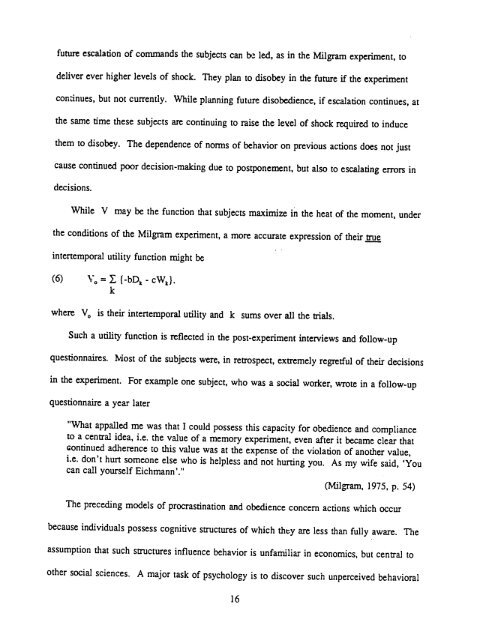INSTITUTE FOR
INSTITUTE FOR
INSTITUTE FOR
Create successful ePaper yourself
Turn your PDF publications into a flip-book with our unique Google optimized e-Paper software.
future escalation of commands the subjects can be led, as in the Milgram experiment, to<br />
deliver ever higher levels of shock. They plan to disobey in the future if the experiment<br />
continues, but not currently. While planning future disobedience, if escalation continues, at<br />
the same time these subjects are continuing to raise the level of shock required to induce<br />
them to disobey. The dependence of norms of behavior on previous actions does not just<br />
cause continued poor decision-making due to postponement, but also to escalating errors in<br />
decisions.<br />
While V may be the function that subjects maximize in the heat of the moment, under<br />
the conditions of the Milgram experiment, a more accurate expression of their true<br />
intertemporal utility function might be<br />
(6) Vo =Z f-bDk - cWkl.<br />
k<br />
where Vo<br />
is their intertemporal utility and k sums over all the trials.<br />
Such a utility function is reflected in the post-experiment interviews and follow-up<br />
questionnaires. Most of the subjects were, in retrospect, extremely regretful of their decisions<br />
in the experiment. For example one subject, who was a social worker, wrote in a follow-up<br />
questionnaire a year later<br />
"What appalled me was that I could possess this capacity for obedience and compliance<br />
to a central idea, i.e. the value of a memory experiment, even after it became clear that<br />
continued adherence to this value was at the expense of the violation of another value,<br />
i.e. don't hurt someone else who is helpless and not hurting you. As my wife said, 'You<br />
can call yourself Eichmann'."<br />
(Milgram, 1975, p. 54)<br />
The preceding models of procrastination and obedience concern actions which occur<br />
because individuals possess cognitive structures of which they are less than fully aware. The<br />
assumption that such structures influence behavior is unfamiliar in economics, but central to<br />
other social sciences. A major task of psychology is to discover such unperceived behavioral<br />
16
















